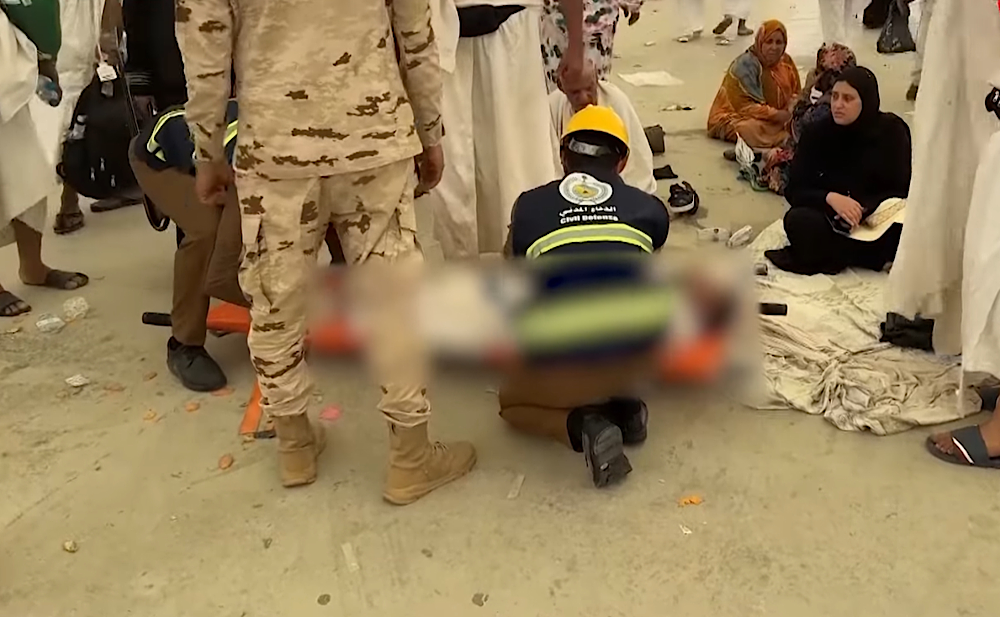More than half of the victims were not registered, arriving via "irregular" channels. The highest number of deaths was reported among Egyptians, but fatalities include people from Indonesia, Malaysia, and Pakistan. In the future, global warming will likely make things worse.

Riyadh (AsiaNews) – More than the fears of the war in Gaza and the risks associated with the crowds in the holy places, cause of fatal accidents with heavy tolls in the past, the number one enemy for the faithful in Makkah during the Hajj this year (14-19 June) is the heat.
So far more than a thousand people have died, AFP reports, based on data provided by various countries. Last year’s death toll was around 240.
Saudi authorities have not yet released any official figure, but Egypt is said to have paid the highest price with 658 deaths from heat and heatstroke, but at least 630 were unregistered pilgrims not eligible to participate.
The religious event has also seen accidents and deaths in the past, as well as outbreaks of communicable diseases like SARS, bird flu, and meningitis.
Every year, tens of thousands of pilgrims try to perform the Hajj without registering or paying the official permit, which can be costly.
Saudi authorities moved out hundreds of thousands of unregistered pilgrims from Makkah earlier this month, but many appear to have eluded security checks, joining other pilgrims during the first rites last Friday.
Unregistered pilgrims are more vulnerable to heat and high temperatures because, without an official permit, they cannot access air-conditioned spaces provided by organisers for the more than 1.8 million authorised pilgrims, to cool off after hours of walking and praying outdoors.
“People were tired after being chased by security forces before Arafat day. They were exhausted,” one Arab diplomat said today, referring to the outdoor prayer that marked the culmination of the Hajj last Saturday.
As the leading cause of death, heat can trigger complications like high blood pressure and other cardiovascular problems.
Malaysia, Pakistan, India, Jordan, Indonesia, Iran, Senegal, Tunisia, and Iraqi Kurdistan have all confirmed fatalities among their citizens.
Complicating things is the fact that this year, Hajj fell during the scorching Saudi summer.
Saudi Arabia’s national meteorological centre reported a high of 51.8 degrees Celsius earlier this week at the Grand Mosque in Makkah.
According to a Saudi study published last month, local temperatures are rising 0.4 degrees Celsius each decade with the future promising even more.
The Islamic calendar is lunar, so the pilgrimage moves back 10 days each year. Thus, while the Hajj is now moving toward winter, by the 2050s it will coincide with the peak of summer in Saudi Arabia. This could be "fatal" as Fahad Saeed, a climate scientist at Pakistan-based Climate Analytics, pointed out.
Heat-related deaths during the major pilgrimage to Makkah are nothing new and have been recorded since the 1400s.
A lack of acclimatisation to higher temperature, intense physical exertion, exposed spaces, and an older population makes pilgrims vulnerable.
More than 2,000 people suffered from heat stress last year, according to Saudi sources, and the situation will worsen as the planet warms up.
According to a 2021 study published in the journal Environmental Research Letters, if the world warms by 1.5° Celsius above pre-industrial levels, the risk of heatstroke for pilgrims participating in the Hajj will be five times greater.
The current deaths are thus a foretaste of things to come for tens of millions of Muslims who will undertake the pilgrimage in the coming decades.
“The hajj has been conducted in a certain way for more than 1,000 years now, and it's always been a hot climate," said Carl-Friedrich Schleussner, a scientific advisor at German institute Climate Analytics. “But ... the climate crisis is adding to the severity of the climate conditions."
Hence, some rites, Schleussner notes, like the climb to Mount Arafat have become "incredibly dangerous to human health.”
No comments:
Post a Comment